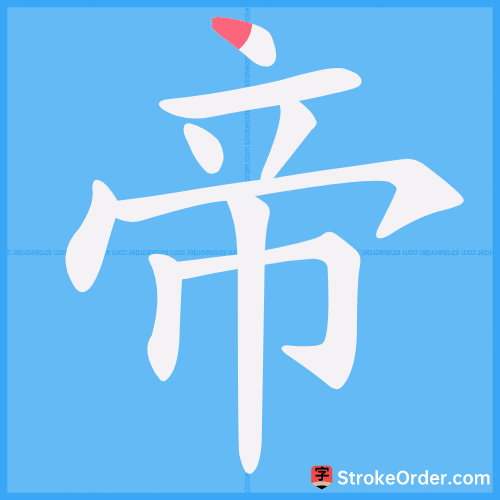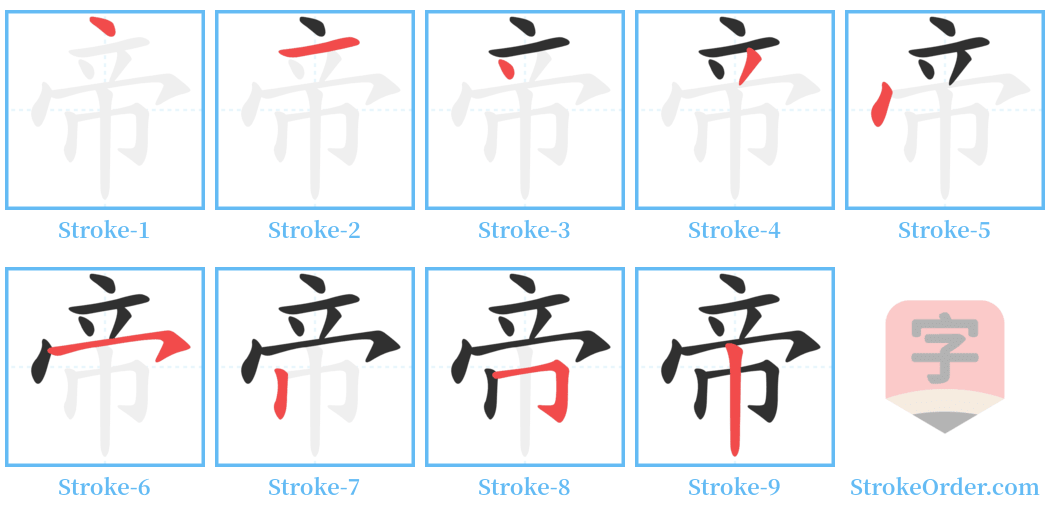帝 Stroke Order
Animated Stroke Order of 帝

Stroke Order Diagrams for 帝

Step-by-Step Handwriting Guide for 帝

Learn to Write Chinese Characters with Video Tutorials
Watch the video of writing the Chinese character "帝", learn the correct stroke order (笔顺) of the character "帝", and master the standard way of writing the character "帝".
Free Printable Handwriting Practice with Stroke Order: 帝
Printable Writing Practice Worksheet of "帝" in Portrait Orientation (Tian Zi Ge)

Printable Writing Practice Worksheet of "帝" in Landscape Orientation (Tian Zi Ge)

Information of 帝
Pinyin
dì
Radical
巾
Strokes
9 strokes
Usage
★★★★★
Definition
emperor
帝 [dì]
(n.)
1. 宗教徒或神话中称宇宙的创造者和主宰者:上帝。玉皇大帝。
(The creator and lord of the universe in religion or mythology: God. The Jade Emperor.)
2. 君主:帝王。皇帝。称帝。帝制。
(Monarch: emperor. To ascend as an emperor. Imperial system.)
3. 天。
(Sky.)
4. 帝国主义的简称。
(Abbreviation for imperialism.)
帝 [dì]
(v.)
1. 称帝,为帝。
(To title oneself as emperor.)
2. 尊奉为帝。
(To regard as emperor.)
帝的本义为花蒂。 字形象形,甲骨文字形表示花蒂的全形,上面象花的子房,中间像花萼(花瓣外面的绿片),下面下垂的象雌雄花蕊。
(The original meaning of the character refers to the flower stalk. The character is pictographic, resembling the full form of the flower stalk. The top represents the ovary of the flower, the middle resembles the calyx (the green leaves outside the petals), and the drooping part below represents the male and female flower parts.)
引例:
《字汇》:帝,上帝,天之神也。
(From "Zihui": Emperor, the supreme God, deity of heaven.)
《诗·大雅·文王》:帝命不时。
("Book of Songs": The orders of the Emperor are not timely.)
示例:
在帝左右。
(At the emperor's side.)
引例:
《周礼·大宗伯》:兆五帝于四郊。
("Rites of Zhou": Announce the Five Emperors in the four outskirts.)
《列子·汤问》:操蛇之神闻之,惧其不已也,告之于帝。
("Liezi": The serpent god heard this, feared it would not stop, and reported it to the emperor.)
示例:
帝乡(传说中天帝居住的仙乡);帝君(古人对神的尊称);帝江(传说中的神名,居于“天山”)。
(Emperor's homeland, the mythical residence of the Jade Emperor; Lord Emperor, a respectful title for gods; Di Jiang, a legendary deity in "Tianshan".)
2. 君主,皇帝。
(Monarch; emperor.)
引例:
《说文》:帝,王天下之号也。
("Shuo Wen": Emperor, the title of kings over the world.)
《尔雅》:帝,君也。
("Erya": Emperor, a monarch.)
《易·泰》:帝乙归妹。
("I Ching": Emperor Yi returns with his younger sister.)
《后汉书·张衡传》:安帝雅闻 衡善求学。
("Book of the Later Han": Emperor An heard that Zhang Heng is learned.)
《战国策·赵策》:争强为帝。
("Strategies of the Warring States": Compete fiercely to become emperor.)
《明史·海瑞传》:揣帝无杀瑞意。
("History of Ming": The emperor has no intention to kill the omens.)
《清·梁启超《谭嗣同传》:于是益知西后与帝之不相容矣。
("Qing Dynasty: Liang Qichao's Biography of Tan Sitong": This further exposes the incompatibility between the West and the emperor.)
示例:
帝王州(帝王居住的地方);帝世(帝王的世系);帝储(皇太子);帝祚(帝位);帝典(帝王的法制)。
(Emperor's state; dynastic lineage; crown prince; imperial position; imperial legal code.)
3. 天。
(Sky.)
示例:
帝宫(天宫);帝青(青天)。
(Emperor's palace; clear sky.)
4. 帝国主义的简称。
(Abbreviation for imperialism.)
示例:
反帝反封建斗争。
(Struggle against imperialism and feudalism.)
帝 [dì]
(v.)
1. 称帝,为帝。
(To title oneself as emperor.)
引例:
《后汉书》:陛下承大乱之极,受命而帝,兴明祖宗。
("Book of the Later Han": Your majesty, in the midst of great turmoil, received the mandate and became emperor, restoring the rule of ancestors.)
2. 尊奉为帝。
(To regard as emperor.)
引例:
《战国策·赵策三》:不敢复言帝秦!
("Strategies of the Warring States": Dare not to speak of Emperor Qin again!)
Flame Emperors (c. 2000 BC), legendary dynasty descended from Shennong 神農|神农[Shen2 nong2] Farmer God
Input Method for 帝
Pinyin
di4
Wubi
upmh|yuph
Cangjie
yblb
Zhengma
suwl
Four Corner
00227
Unicode
U+5e1d
Same Pronunciation Characters